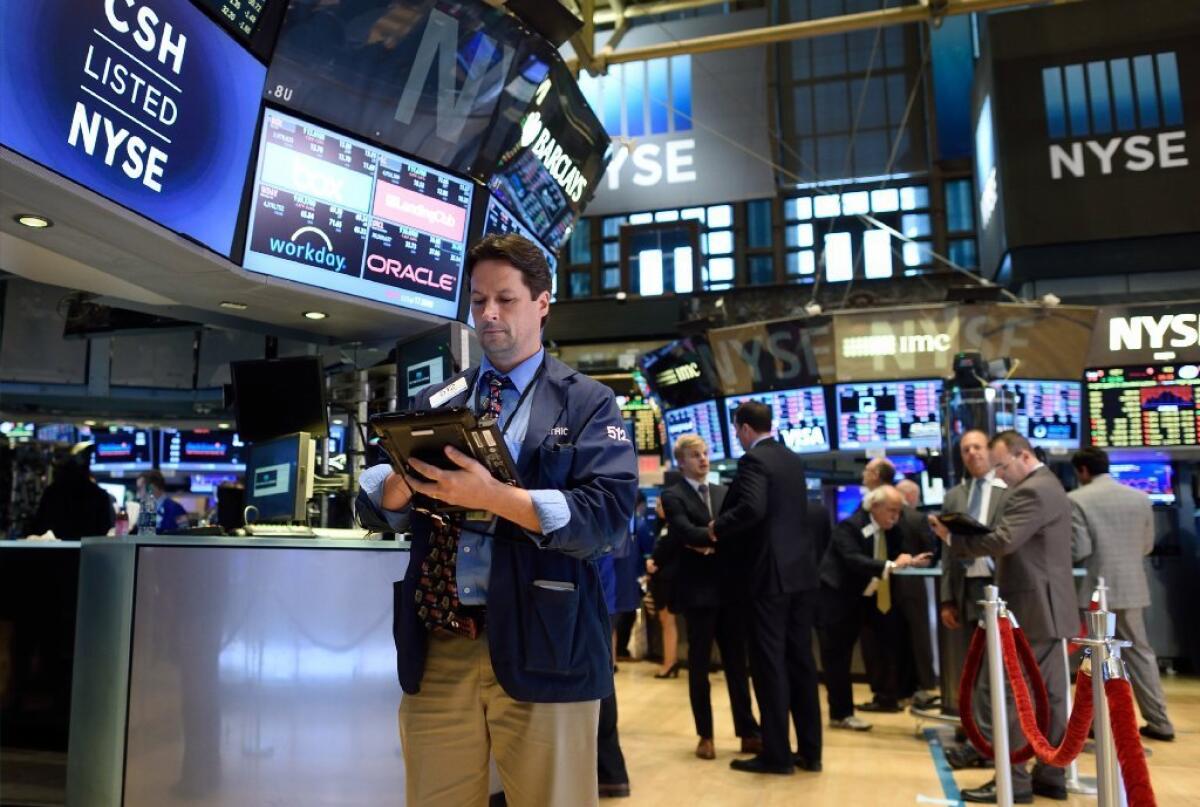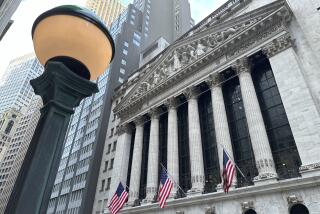U.S. stocks, after surging to start the day, end with a thud

Traders on the floor of the New York Stock Exchange on Aug. 24.
And just like that, the rally vanished.
Stocks had rebounded strongly in early trading from a week of severe drops, but the rally couldn’t be sustained, especially in the final hour, when prices went into a near free-fall.
Many investors no doubt hoped the early rally, in which the Dow Jones industrial average jumped out to a 442-point gain, would hold firm and partly offset the market’s recent plunge.
Investors drew added hope from seeing most other global financial markets rebound Tuesday despite yet another stock-market drubbing in the world’s biggest economic trouble spot, China.
Instead, the Dow finished with a 204.91-point loss at 15,666.44, an 18-month low and its fifth consecutive triple-digit decline. But the 1.3% drop was much less drastic than deep dives the previous few trading days.
Even so, the average of 30 blue-chip stocks now has plunged 14.4%, or 2,465.95 points, from its record high in mid-May.
The broader Standard & Poor’s 500 index, up nearly 3% early in the day, fell 25.60 points to 1,867.61, and the Nasdaq composite index shed 19.76 points to 4,506.49.
So what happened Tuesday?
Start with the fact that the problems weighing on the market — worries about a slowdown in China’s economic growth and confusion about the Federal Reserve’s plans for U.S. interest rates — remained firmly in place.
With the market showing early gains after its recent drubbing, “people sold into that strength” to either earn some profits or at least pare their recent losses, said John Bollinger, president of Bollinger Capital Management in Redondo Beach.
“That selling stopped the rally and gradually overcame whatever optimism was in the market,” he said. “A lot of people were looking for that [early] bounce to run two or three days. But when they saw the rally running out of steam, they had to sell.”
That doesn’t mean investors have thrown in the towel. Quite the contrary, some money managers said their customers were eager to take advantage of the market’s recent drubbing.
Money manager Todd Morgan said his phone started ringing when the market rallied early Tuesday as clients saw some opportunities to buy after the Dow plunged 1,089 points at Monday’s opening and ended with a 588-point loss.
“I got a couple of calls [from clients] saying, ‘I hope you bought for me at the bottom yesterday when the Dow was down 1,000,’” said Morgan, chairman of Bel Air Investment Advisors, a Los Angeles firm that caters to wealthy clients.
“People also are starting to call us and saying: ‘Should we be nibbling more? Should we be adding more’” stocks? Morgan said.
A.C. Moore, founder and chief investment strategist of Dunvegan Associates Inc. in Santa Barbara, said he’s hearing similar comments from his customers. “It’s been more of a case of ‘Are we taking advantage of this?’ Prices have come to us,” he said.
But the market’s volatility could persist through the week, owing partly to uncertainty over whether the Fed will raise its benchmark U.S. interest rate next month from its current low of near zero.
The Federal Reserve Bank of Kansas City, one of the Fed’s 12 regional banks, holds its annual summer symposium in Jackson Hole, Wyo., starting Thursday, and “financial markets will be closely attuned to any color emanating from the Jackson Hole symposium” with regard to rates, Wells Fargo Economics said in a note to clients.
Fed Chairman Janet L. Yellen has said she would not be attending, but the vice chairman, Stanley Fischer, is scheduled to speak Saturday.
The central bank had indicated a desire to start lifting rates next month. But the slowdown in China and the turmoil in financial markets have many Fed watchers thinking a rate increase should remain on hold.
Either way, “you’re worried about an unexpected comment” from Fed officials that could move the markets, said Bill King, chief market strategist at M. Ramsey King Securities.
Rather than risk a wrong-way bet on stocks, “a lot of investors are moving out of equities and into cash,” said Mark Kiesel, a managing director of Pacific Investment Management Co., or Pimco, in Newport Beach.
Bonds also have been the typical sanctuary for nervous investors fleeing stocks in a Wall Street downturn, and plenty of investors have been buying U.S. Treasuries as a more secure alternative in recent days. Increased demand for those notes has driven up their price and reduced their yield.
On Monday, the yield on the 10-year Treasury bond fell below 2% for the first time since April. It rose to 2.07% Tuesday.
China has become the catalyst for global stock woes largely because investors worry that the world’s second-largest economy is facing a more serious slowdown than many had expected. That fear was exacerbated by China’s recent decision to devalue its currency, which ignited the sell-off in Chinese stocks.
China’s key stock index, the Shanghai composite, plunged 8.5% on Monday, erasing its gains for the year, and it tumbled an additional 7.6% on Tuesday. It has now plunged 40% from its June high.
At the same time, China’s central bank Tuesday cut interest rates and flooded its banking system with added cash.
Unlike other days in the last week, other key global indexes did not follow the Shanghai’s fall. Germany’s DAX jumped 4.3%, and the CAC-40 in France rose 3.9%. The FTSE 100 index of leading British shares rose 2.6%
Amid fears of global economic weakness, crude oil prices tumbled below $40 a barrel Monday for the first time since the economic crisis in early 2009. Light crude for near-term delivery gained $1.07 on Tuesday to $39.31 a barrel on the New York Mercantile Exchange.
The euro fell against the dollar to $1.15 from $1.16.
MORE ON STOCK MARKET:
California officials eyeing stock market plunge, hope it won’t last
Global stock sell-off is a big test of U.S. economy’s resiliency
Tech sector faces challenges if the stock market slide continues
More to Read
Inside the business of entertainment
The Wide Shot brings you news, analysis and insights on everything from streaming wars to production — and what it all means for the future.
You may occasionally receive promotional content from the Los Angeles Times.











